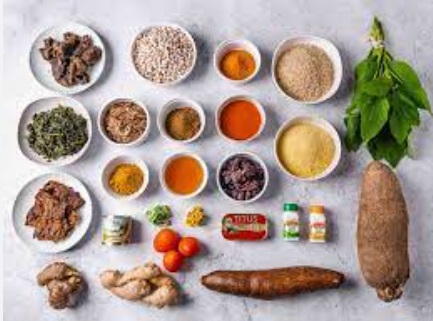There is an amazing variety of herbs, spices and food ingredients available in Nigeria. They are quick reminders of the broad diversity of tribes and traditional dishes in the country. Some Nigerian ingredients for cooking are locally grown and used in one or more particular regions. There are also those commonly used Nigerian ingredients for cooking that are well known across the country. While a good number of them are sourced from other lands.
It is also important to know that the various ethnic groups of Nigeria have their own traditional dishes reserved for special occasions and festivities. These include special Nigerian dishes cooked on religious holidays – such as Christmas, Sallah, or New Year.
A Quick Highlight of Popular Nigerian Ingredients for Cooking
Nigerian dishes are a flavorful mix of herbs, spices and ingredients. Thus, we will venture to highlight those important Nigerian ingredients for cooking. We also aim to direct you to trusted and authentic sources where you can get them as fresh as possible – both online and offline.
Root Crops and Vegetables
Several root crops are well known and widely consumed Nigerian food ingredients. They include tubers such as yams, potatoes, cassava; and rhizomes such as ginger and turmeric. Root vegetables such as several varieties of onions and garlic are also commonly consumed.
Peppers
Arguably the most popular spice in Nigeria is the iconic Pepper – in its many local varieties. Several varieties of pepper are consumed in Nigeria – they include habanero/hot pepper, chili pepper, bell/sweet pepper, and cameroon pepper. They are often consumed fresh; but they are also commonly dried and ground for preservation.
Chili and habanero peppers are commonly used in northern and southwest Nigeria. In the southeast and South-South regions, cameroon peppers are a vital ingredient in traditional dishes, in addition to the habanero and chili varieties. They add a sharp, spicy taste; as well as irresistible aroma to meals
Cooking Oils: Palm Oil, Vegetable Oil and Coconut Oil
By far the most important cooking oil in Nigeria is palm oil. Palm oil has been grown in Nigeria; and used for cooking, cosmetics, and other uses for centuries. The vast majority of Nigerian traditional dishes (especially soups and stews) require palm oil. Palm oil is an abundant source of Vitamin E and unsaturated fats.
However, modern Nigerian ingredients for cooking now include vegetable oils (such as groundnut, sunflower, olive, soya oils) and coconut oil.
Fish
There are several varieties of fish consumed across Nigeria, in fresh and dried (or smoked) form. They are even more heavily consumed by the indigenous tribes that live and fish along the coasts and riverine areas south of Nigeria. Indigenous varieties such as Tilapia and Catfish are often caught and dried (or smoked) for preservation. While there are several imported ones, in the form of frozen and dried fish. Stockfish (dried hake) and smoked catfish are particularly popular in the southeast and south-south regions of the country.
Locust Bean
Locust beans (otherwise called ‘Iru’, ‘Dawadawa’, ‘Ogiri’ amongst other native names) is a seasoning and food ingredient widely used across Nigeria. It is typically used to make soups and stews. It might interest you to know that locust beans contain substances that help to maintain good vision. They also help to subdue diseases such as hypertension and diabetes.
Ogbono
Ogbono is the seed of wild mango. It is ground and used to make the popular slimy soup called Ogbono soup – widely consumed across many states in southern Nigeria. It has a savory flavor and aroma.
Dried Crayfish & Crabs
Crabs and crayfish are quite abundant in the many coastal waters, rivers and lakes found across Nigeria (and the rest of Africa). Crayfish are caught and dried/smoked, to be added as one of the vital Nigerian ingredients for cooking traditional dishes. Crabs are often consumed fresh.
Egusi
Egusi (or Melon seed) is a very famous Nigerian ingredient for cooking soups and stews. It is widely consumed all over Nigeria, and is often used as a thickener. Depending on the region and/or tribe, Egusi is prepared in slightly different ways.
Herbs and Spices
A good number of Nigerian soups and stews are cooked with special herbs and vegetables. Herbs in particular are famous for adding unique tastes and flavors to soups, stews and traditional dishes. Herbs that are known to be typical Nigerian ingredients for cooking include Thyme, Basil, Coriander, Mint, Parsley, Dill, Bay leaf, and Uziza.
In addition, a vast number of both indigenous and imported spices are widely used in Nigeria. Indigenous spices include Alligator pepper, Ehuru (Calabash Nutmeg), Erhie, Suya/Yaji spice, Uda (Grains of Selim), and Ugba. Garlic, Ginger, Curry, Nutmeg, Onions, Shallot, Cloves, Sage and Rosemary are some of the commonest imported spices found in Nigerian homes as well.
Fruits and Vegetables
Vegetables and fruits are an important accompaniment to Nigerian meals. Some fruits are seasonal; while many of them are often available both in and out of season. Commonly consumed Nigerian fruits include Bananas, Pineapples, Oranges, Tangerines, Watermelon, Pawpaw and Mangoes.
Vegetables such as Tomatoes, Bitter leaf, Waterleaf, Pumpkin leaves, Jute, Okro, Garden eggs and many species of Spinach are very common nationwide. Okazi and Oha are vegetables native to southeast Nigeria. You will also find Igbo, Ebolo, and some other vegetables indigenous to southwest Nigeria. Baobab leaves are a popular ingredient in soups made in Northern Nigeria.
Aside from these, several imported fruits and vegetables are becoming very popular, especially in Nigerian cities (where they are often used for salads). Such notable vegetables include Carrots, Lettuce, Cabbage, Peas, Beetroot, Radish, White onions, Leeks, Broccoli, Asparagus, Eggplant, Chicory, Cucumber and Cauliflower. Imported fruits like Apples, Pears, Avocados, Plums, Peaches and Grapes are also fairly common.
Other Popular Nigerian Staples for Cooking
There are other popular Nigerian staple foods consumed all over the country – such as Plantains, Rice, Beans, Maize, Wheat, and Groundnuts. Some other foods and herbs are indigenous to certain regions, and thus more commonly consumed there. For instance, Millet, Sorghum, and Guinea corn are grains commonly eaten in northern Nigeria. Okpa (Bambara nuts) are commonly eaten in southeast Nigeria – especially in and around Enugu.
Where to Source Nigerian Food Ingredients
Fortunately, there are several Nigerian farmers and traders who have been involved in the exportation of local Nigerian ingredients for cooking. Thus, you will find these ingredients in many local Nigerian markets; African, Caribbean and Afro-Caribbean food and grocery stores across the world. You can also order them from renowned online stores. You can visit the following online stores to get your fresh, healthy, and well-packaged Nigerian ingredients for cooking delivered to your doorstep:
.








